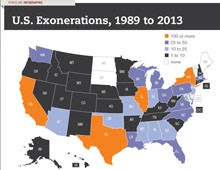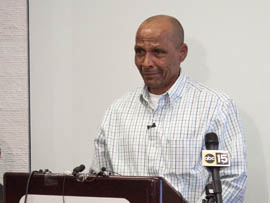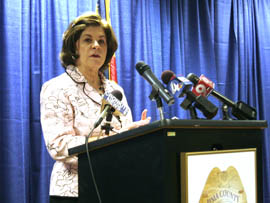Cronkite News has moved to a new home at cronkitenews.azpbs.org. Use this site to search archives from 2011 to May 2015. You can search the new site for current stories.
Report: Arizona in middle of states for exonerations in criminal cases
WASHINGTON – The release of a Tucson man in a decades-old arson-murder case made headlines this week, but a new national report shows Arizona is in the middle of the pack when it comes to exonerating prisoners.
Arizona exonerated 12 prisoners between 1989 and 2012, tying it with Maryland for 21st place, according to the National Registry of Exonerations, a project of the University of Michigan Law School and the Center on Wrongful Convictions at Northwestern University School of Law.
California led the nation with 119 exonerations in that period.
Defense lawyers said it is tough to read meaning into the Arizona numbers, but welcomed any exonerations as progress.
“This idea that conviction is final has really been challenged,” said Andrew Hacker, staff attorney for the Arizona Justice Project, based at Arizona State University’s Sandra Day O’Connor College of Law.
The justice project helped free Louis Taylor, who walked out of prison this week after questions were raised about his conviction in connection with the 1970 Pioneer Hotel fire that killed 29 people.
Taylor’s release is not actually an exoneration. Even though his previous convictions were vacated, he agreed to plead no contest to the charges in exchange for being sentenced to time already served. But the plea had the effect of letting him walk free Tuesday after more than 40 years behind bars.
The convictions were vacated after new methods of arson analysis questioned whether the Pioneer Hotel fire could be attributed to arson. Pima County prosecutors said in court filings that they still believe evidence in the case points to arson, and to Taylor, but that a retrial would be difficult if the original arson findings were called into question.
Pima County has the most exonerations in the state, with six, according to the registry. Maricopa County had five and Yavapai County had one.
Hacker said it is good to see some counties where “justice is done instead of conviction maintained.”
Of Arizona’s 12 overturned cases, seven involved death row inmates. That is much higher than the nation as a whole, where roughly 10 percent of exonerations involve death row cases, said Samuel Gross, a Michigan law professor and editor of the exoneration registry.
Like Hacker, Gross could not point to any one factor for a state’s number of exonerations. He said it could be attributed to state law, to the original conviction process in a specific case or to the availability of resources to press appeals.
But he credited aggressive organizations like the Arizona Justice Project – also known as innocence projects – for investigating and bringing to light discrepancies in cases.
It was the uncovering of such discrepancies by the Arizona project and CBS’ “60 Minutes” that led Pima County prosecutors to ask a court to re-examine the Taylor case.
Gross said nearly all of the exoneration cases in the registry’s report came about because of public attention or the efforts of innocence projects. He said the states with the most exonerations – California, Texas, Illinois and New York each has more than 100 cases – are all home to organizations that work aggressively to help the convicted.
Gross said the courts should be more willing to reverse course and overturn previous rulings.
“We need to be more ready to acknowledge mistakes were made,” Gross said. “Change in attitude is more important than any policy.”
And he insists that the current list makes up only a small number of those convicted for crimes they never committed.
“There are more wrongful convictions. We don’t think we’ve scratched the surface in wrongful convictions,” Gross said. “This is a tiny number.”
Hacker said organizations like his intend to keep pressing to raise that number, until no one is convicted wrongly and that those who are unjustly behind bars are released.
“We’re sort of in business to go out of business,” he said.









